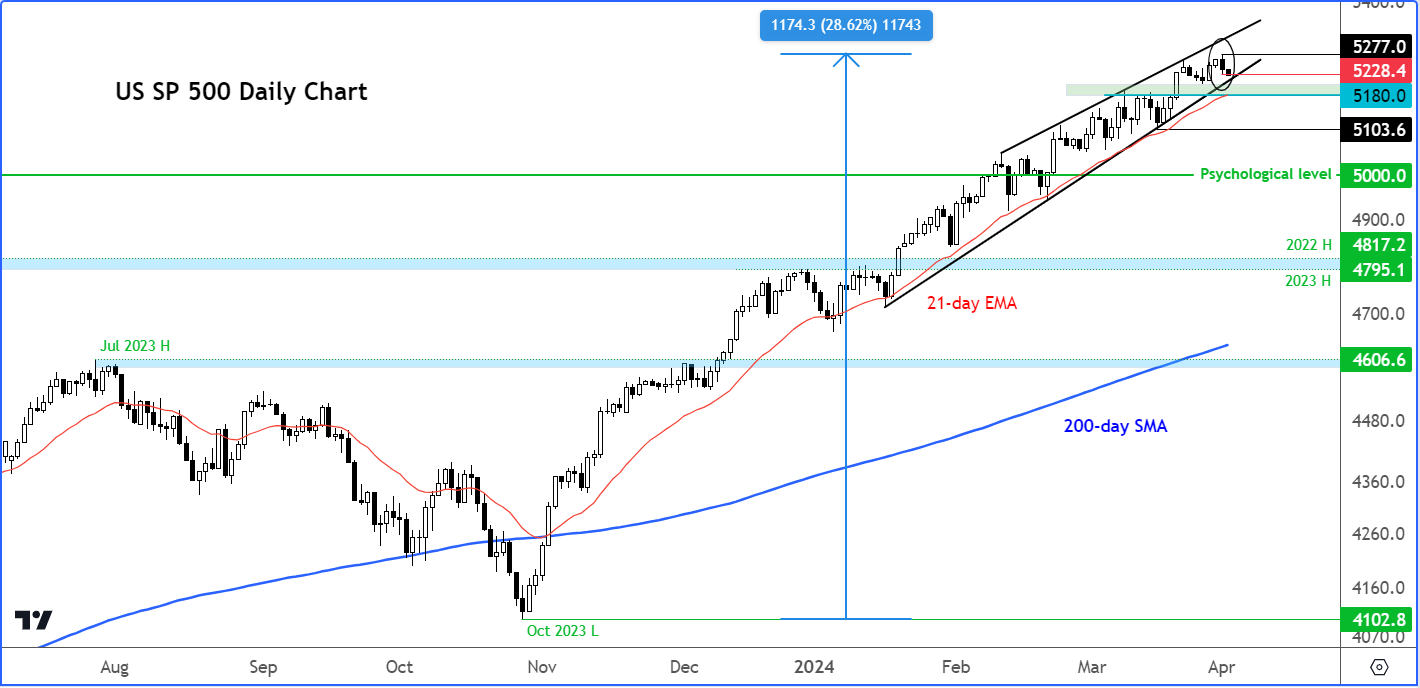- Stock bulls may find it difficult to justify buying stocks at these elevated levels as yields rise.
- Rising crude oil prices pose additional risk to the inflation outlook.
- S&P 500 technical analysis shows a potential crack in the bullish trend but confirmation is needed.
The likes of the Dow Jones Industrial Average and S&P 500 retreated sharply after hitting fresh record highs in the first trading day of the month and quarter on Monday. The mini-reversal came amid renewed concerns about inflation and profit-taking following the massive gains in the last two quarters.
Hopes that the Fed and other central banks would ease interest rates and the hype over AI caused the S&P 500 to rise about 28% from its lows in October. Following such a big move, the risks of a correction are high, especially when you consider for example that oil prices are pushing $85 per barrel and governments are facing rising costs of servicing their debt as yields climb, making it increasingly difficult to continue borrowing without raising the debt-to-GDP ratios to alarming levels.
So far in 2024, these worries and concerns about over-stretched valuations have been shrugged off by investors. Let’s see if that changes as we start Q2 and head deeper into 2024. Bearish speculators still need to see a confirmed reversal signal of the charts given the strength of the rally in the past 5 months or so.
What has caused yields to rise again?
The 10-year yields rose 10 basis points on Monday, before climbing further in the first half of Tuesday’s session as WTI crude oil prices climbed above $85.00 per barrel. Monday’s moves in yields were triggered by economic data from the world’s largest economies as purchasing managers in both Chinese and US industries reported growth in activity, which surpassed expectations.
However, the ISM manufacturing PMI also raised inflation worries as the prices sub-index jumped to 55.8 from 53.3, sending bond yields higher and further reducing the prospects of aggressive rate cuts. The data caused commodities like crude oil to rally as it further alleviated growth concerns. Today, WTI surpassed the $85, further fuelling inflation worries.
What to expect this week?
Looking ahead to the rest of the week, Federal Reserve speeches scheduled for this week are in double digits, and the market may anticipate Monday’s manufacturing data to instill caution among officials regarding substantial policy easing. Additionally, numerous jobs reports are expected throughout the week, with Friday's nonfarm payrolls figures and unemployment rate being the highlights on the US economic calendar.
As a result, trading could be volatile in the week ahead. I guess for stock market bulls, any signs of a soft landing would be welcome as that will keep the prospects of a rate cut in June alive. The bears will want to see further evidence of sticky inflation.
S&P 500 500 analysis and trade ideas
Stocks have been on a blinder for the last three months, thanks to AI optimism and everyone feeling positive about potential interest rate cuts by the Federal Reserve, and other major central banks, later in the year. Since late October, the S&P 500 has shot up about 28%, but there's some worry that the market is a bit exposed to some short-term profit-taking.

Source: TradingView.com
On Monday, the S&P 500 chart printed a small bearish-engulfing candle on the daily time frame, which meant that the small gains from the last trading of last week (Thursday) were wiped out. What we will need to watch out for today is to see whether there will be further downside momentum after that bearish shift, or if we go back inside Monday’s range. The bears will want to see some real commitment this time, as their past attempts to trigger a correction have been futile.
Even if we see a small pullback, the bears will still need to see further evidence of a market top. For example, a break from the rising channel or wedge would be needed. Key short-term support comes in at around 5180, where the 21-day exponential moving average also comes into play.
If this level breaks, only then will things turn a bit interesting. Otherwise, it is likely to be more of the same: minor dips being bought. Interestingly, the S&P 500 hasn't experienced even a 2% pullback during its melt-up since November, underscoring the strength of the ongoing rally.
Disclaimer: This article is written for informational purposes only; it does not constitute a solicitation, offer, advice, or recommendation to invest as such it is not intended to incentivize the purchase of assets in any way. I would like to remind you that any type of asset, is evaluated from multiple points of view and is highly risky and therefore, any investment decision and the associated risk remains with the investor.
